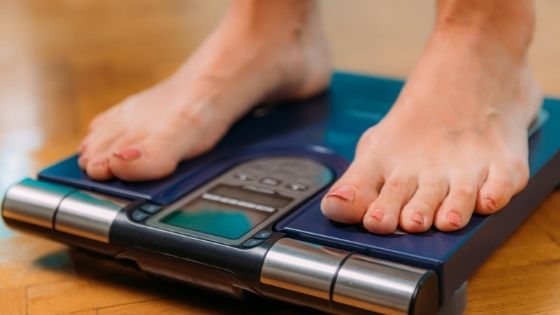How much body fat can you lose in a month? The Truth Exposed!

How much body fat can percentage can you lose in a month? Maximum body fat loss per month? The average person can expect to lose 1% to 3% of their body fat each month.
You might have more or less than that, though. The range varies from person to person because so many factors affect it, such as your gender, age, and how much body fat and muscle you have when you start.
Losing weight can be challenging, but it's even more complicated if you don't know how much fat you're losing at a time.
You might think that the easiest way to lose bodyweight is by eating less and exercising more. But according to science, this isn't always true.
Many factors are involved in your body composition, such as your age, gender, and genetics, that play a massive role in how fast your body burns fat.
For example, men tend to burn fat faster than women because of their higher muscle mass than women, who average body fat.
The only way to find out what works best for your unique situation is with a personalized plan. We'll help you figure out what is best for you by tracking your food and exercise and how active your body is.
How can you measure your body composition during weight loss?

BIA scale
Using a bioelectric impedance (BIA) scale is an excellent way to measure your body fat. A small electrical signal goes through your body and measures the resistance of your fat.
There is a possible error of 3%-5% on BIA. That depends on your hydration status, the time of your last meal, how much exercise you've done recently, and if you have alcohol in your system or are taking certain medications. The error could be even higher than 5%. So follow the guidelines given by the manufacturer.
SOURCES: medicinenet.com, mdpi.com (nutrients)
Measuring tape
To measure fat loss, use a tape measure. It will assist you in determining your body composition and ensuring that you've shed a few pounds. And don't worry if you're not an expert; these measurements aren't tricky.
To measure your waist:
- Breathe out completely and wrap the tape measure around your bare abdomen above the hip bone.
- Make sure that it is parallel to the floor.
- Relax, exhale, and read the measurement when you're done.
Place the tape at a point halfway between your belly button and groin for your hips. Next, measure around the widest point of your buttocks. Again, make sure the tape is parallel to the floor and snug but not squeezing into your skin.
To measure your thighs, wrap the cloth around the widest part of each thigh. For arms, wrap it around your mid-upper arm (bicep) and note down the measurement where you can feel a bone on your arm.
Here I leave you a video by Uly Sambrano to learn how to measure your body fat.
What is a healthy body fat percentage?
For men, the healthy body fat percentage should range from 6% to 24%, whereas for women, it should be between 14% and 31%. Keep in mind that the proportion varies with age, but it should generally remain within a healthy range.
7 Tips to reduce your body fat percentage
Don't worry about losing weight. Instead, focus on your body fat percentage.
Losing weight is not easy, especially if you are overweight or obese. Most mainstream diets have failed to produce substantial results for most people over many years. However, if your goal is to lose weight quickly, then here are some general guidelines that you can use to determine how much weight you can expect to lose each week.
Calculate your calorie intake
Remember, successful dieting is 80% nutrition and 20% exercise. Use an app or the internet to track what you are eating every day for at least a few weeks to get a better idea of your current average daily calorie intake.
If you burn more calories than you consume every day, you will lose weight. You can use our online calculator like ours to estimate how many calories your body needs each day.
Eat small amounts of food frequently throughout the day.
If you overeat at once, your body will spend a lot of energy breaking it down and digesting it. For most people, three meals per day are about right. But if you feel hungry before dinner or between breakfast and lunch, then eat something small like a protein shake or some fruit.
Your body will digest food faster if you eat until you are satisfied but not stuffed.
Many people believe that eating less than 1500 calories per day is impossible for men and dangerous for women. But the truth is that many people have lost weight successfully on a daily intake of just 1000-1500 calories per day.
Remember that when you stop eating, your body will automatically burn stored fat until it reaches the weight that your maintenance calorie intake predicts.
Exercise on sunny days
Exercising outdoors may raise fat burning by 20%, owing to the production of leptin, which causes our body to burn overweight bags faster.
Introduce whole-grain products into your diet
The consumption of bread, rice, and other whole grains may help you feel fuller for longer, which might assist you in avoiding eating additional calories from other meals with more content of undesirable fats for the body.
That does not imply that you must overindulge in this sort of food; instead, you should strive to maintain a varied and balanced diet.
Obesity is a significant health hazard that we must wage against to have a higher quality of life and less chance of developing deadly illnesses.
Do not abuse salt
Because it makes your body retain fluid, fat accumulates in areas of the body where it is prone to occur. In addition, salt makes you want to drink high-calorie beverages.
Graham MacGregor, a professor of cardiovascular medicine in London, has found that they drink two fewer sugary drinks per week when children halve their salt intake. That means they eliminate more than 230 calories from their diet.
Exercise in the early hours of the day
According to studies, cardio activity early in the day helps you burn fat faster. In addition, you may lose a pound more than later in the day during these hours.
Have oatmeal for breakfast
Oatmeal is a great breakfast food that aids in weight management from the start of your day. Finally, oatmeal is a lively and nutritious meal consumed to help reduce weight and preserve lean body mass. In addition, its high fiber content and vitamins assist fat absorption.
Benefits of eating oatmeal in the mornings:
Oatmeal is high in essential amino acids, fiber, and omega 3 acids, which work together to help reduce cholesterol.
- It is an antioxidant.
- It reduces blood pressure.
- Oatmeal helps reduce appetite.
- It improves the immune system.
- Oatmeal lowers the chance of developing type 2 diabetes or Mellitus (characterized by a high blood glucose level).
- It is suitable for skincare.
- Oatmeal has expectorant effects, making it easier to cough out anything trapped in the lungs.
- It aids in body fat reduction, so it's frequently included in slimming diets since it helps retain more fluids, and fiber keeps fat and pollutants from being excreted as efficiently.
You can also take supplements to help with weight loss. There are many different kinds of supplements, so be sure to research the best one for you.
Some people prefer to take a natural approach to weight loss, while others use supplements as part of their weight loss plan.
No matter what method you choose, consult with your doctor before starting any new weight loss plan.
How much fat can you expect to lose each week?
A good rule of thumb is one to two pounds per week after the first few weeks of being on a calorie deficit diet. But it can vary widely depending on how much you have to lose, your metabolic rate, activity levels, gender, and age.
Calculate the number of calories you need based on how many pounds you want to lose each week. Then subtract 500 from this number of calories to create a calorie deficit. For example, if you need 2,000 calories per day to maintain your current weight, you will want to aim for 1,500 calories per day for a 500-calorie deficit.
That is just an estimate based on average data, so be sensible with setting your goals and stay consistent.
How much body fat can you lose in a day?
While losing more than three pounds in a day is possible, it is usually only temporary water weight loss. The body is made up of 50-75% water, and a large amount of that weight is removed when we sweat, urinate, or have a bowel movement.
When we don't replenish the water our bodies have lost, we may see a significant weight loss on the scale. However, as soon as we drink fluids or eat food, our bodies will quickly regain the lost water weight.
It is essential to focus on healthy eating habits and exercise for long-term weight loss rather than quick fixes that only lead to temporary results.
Conclusion
You've heard about a friend or co-worker who lost 10 pounds in a month. It seems impossible, but it is possible. After all, the average person can expect to lose 1% to 3% of their body fat each month. So a normal range is losing 4 to 8 pounds per month.
If you want more information on how you can make this happen for yourself and where your weight loss should be by now, according to your age and height, read our articles here!
We have tons of helpful advice on what you need to know if you're trying to get rid of that stubborn belly fat or any other type of fat.
DISCLAIMER: buildyourbody.org does not provide medical advice, examination, and diagnosis.
Medically reviewed and approved by Nataniel Josue M D.


